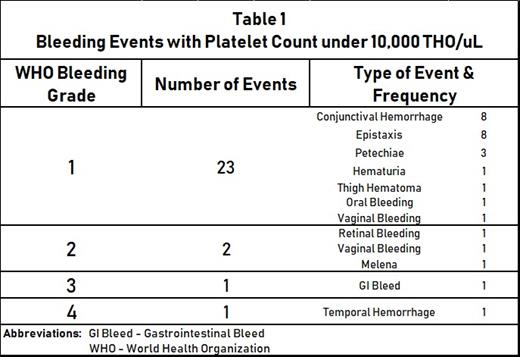Abstract
Background
Managing thrombocytopenia with a prophylactic strategy was previously recommended for patients with impaired bone marrow function, hematological malignancies, and recipients of HCT when platelet counts declined to under 10,000/uL. However, the updated 2018 ASCO guidelines now suggest a place for a therapeutic i.e., after a bleeding event rather than a prophylactic platelet transfusion strategy for patients with hematologic malignancies undergoing autologous HCT. Studies show a lack of significant difference between trial groups in hemostatic outcomes, such as the number of WHO grade 2-4 bleeds, and number of days with bleeding events. Platelet transfusions increase risks of infectious and non-infectious complications as well as inducing a platelet refractory state. Our Transfusion Free Medicine Program has now performed over 200 autologous hematopoietic stem cell transplants (HCT) in Jehovah's Witnesses who due to religious convictions, do not accept red cell or platelet transfusions.
Vitamin K is a fat-soluble vitamin that is required for normal blood clotting. Autologous HCT patients are at risk for vitamin K deficiency from multiple reasons including malnutrition, frequent use of antibiotics, chemotherapy induced gastrointestinal toxicity leading to malabsorption and colitis. The prothrombin test lacks the sensitivity and specificity to detect mild deficiency. A mild vitamin K deficiency may be underdiagnosed in our transplant patients adding to bleeding risk. With the effective use of antifibrinolytic agents and Vitamin K as an alternative to platelet transfusions we believe this may enhance hemostasis and prove a valuable adjunct to a therapeutic approach.
Methods
Patients in our study were those who were of the Jehovah's Witness faith undergoing autologous HCT for Multiple Myeloma and Lymphoma. Patients received aminocaproic acid as an alternative to platelet transfusion to enhance hemostasis at a dose of 1 g every 4 hours or prophylactically for platelet counts less than 30,000 /uL. Titration to 4 g every 4 hours intravenously was required for platelet counts less than 10,000/ul or clinical bleeding. Vitamin K 10 mg orally or subcutaneous was also started at this time.
Results
Table 1 illustrates the low number of bleeding events especially grade 3 or 4 that occurred. There were no Grade 3 or 4 bleeding events in patients with platelet counts above 5000/uL. No patient had residual long term effects nor was there an increase in thromboembolic events.
Conclusions
These data add to the body of literature supporting a therapeutic platelet transfusion strategy in an experienced center for autologous HCT patients and challenges the prophylactic platelet count of 10,000 /uL suggesting instead 5000/uL. The safety and efficacy of antifibrinolytic agents and Vitamin K as an alternative to platelet transfusions to enhance hemostasis in autologous stem cell transplant patients may prove beneficial not only in JW patients but also in those transplant centers wishing to offer a therapeutic platelet transfusion approach and as a strategy to manage platelet refractoriness.
No relevant conflicts of interest to declare.
Aminocaproic Acid is an antifibrinolytic agent approved for treatment of bleeding in surgical patients and hematological bleeding disorders. Vitamin K is approved for use in reversal of anticoagulation from Warfarin, vitamin K deficiency without liver disease and in the newborn.


This feature is available to Subscribers Only
Sign In or Create an Account Close Modal